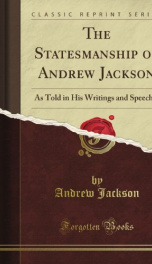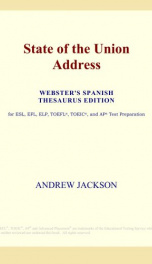the statesmanship of andrew jackson as told in his writings and speeches

9Introduction.For nearly forty years Andrew Jackson was the most popular man in America; from the day when he won the great victory at New Orleans until his last utterances at " The Hermitage," the common people heard and followed him gladly: and for years after his death, his name was a name to be conjured with in American politics. He left the presidency as popular as he entered it, and having served two terms named his successor. Of no other President is this true. And though Van Buren's administration reaped the whirlwind, the mass of the American people did not for a moment blame Andrew Jackson as the cause of panic and disaster. The German historian of the United States, Von Hoist, writes of " The Reign of Andrew Jackson," and later historians and biographers have caught up the strain. Tyranny and despotism were easy words in Jackson's time: he often uses them when speaking of nullification, and the Whigs applied the terms to Jackson's administration. It is somewhat paTable of Contents CONTENTS; PAGE; Biographical Outline7; Jackson's Cabinet10; Introduction11; LETTERS OF NULLIFICATION, 1830-1833:; To Robert Oliver, October 26, 1830 17; To Joel R Poinsett, December 2, 1832 18; To Joel R Poinsett, December 9, 1831 -19; To Joel R Poinsett, January 16, 1833 21; To Joel R Poinsett, January 24, 1833 22; To Joel R Poinsett, February 7, 1833 25; To Joel R Poinsett, February 17, 1833 27; STATE PAPERS, 1829-1837 :; First Inaugural Address, March 4, 1829 -31; » First Annual Message, December 8, 1829 35; » Veto Message, May 27, 1830 66; - Second Annual Message, December 1830 82 Message on Indian Affairs, February 22, 1831 -125; * Third Annual Message, December 6, 1831 133; Veto Message, Bank of the United States, July 10, 1832 154; - Fourth Annual Message, December 4, 1832 177 Message on the South Carolina Ordinance and Proclamation of Governor Hamilton, January 16, 1833 ? 200; Anti-Nulli
Info about the book
Author:
Series:
Unknown
ISBN:
1171907028
Rating:
4/5 (4)Your rating:
0/5
Languge:
English
Users who have this book
Users who want this book
What readers are saying
What do you think? Write your own comment on this book!
write a commentGenre
if you like the statesmanship of andrew jackson as told in his writings and speeches try:
Do you want to exchange books? It’s EASY!
Get registered and find other users who want to give their favourite books to good hands!




